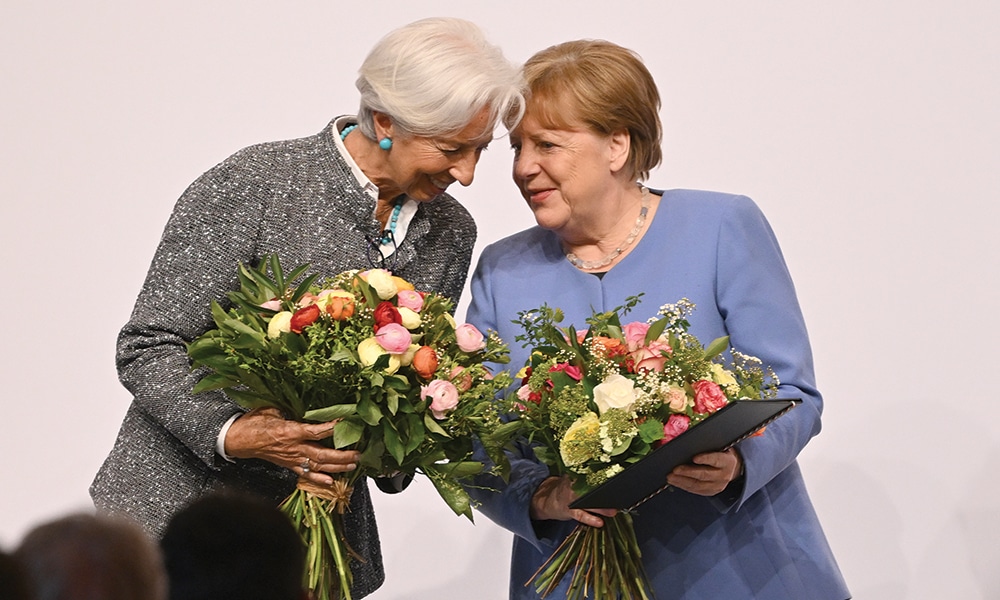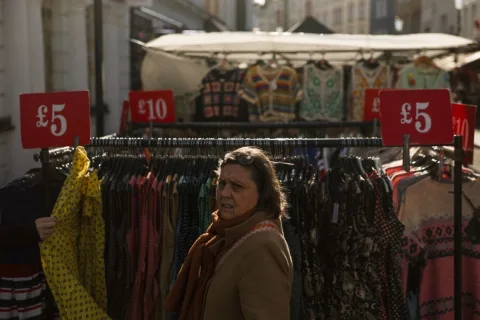FRANKFURT: The European Central Bank celebrated its 25th anniversary Wednesday but soaring inflation in the eurozone threatened to put a damper on festivities at the Frankfurt-based financial institution. To mark the occasion, around 200 guests will descend in the evening on the ECB’s imposing steel-and-glass tower on the banks of the Main river in Germany’s financial capital.
With music from French composer Claude Debussy playing, ECB president Christine Lagarde will cut a cake as she is joined by two of her predecessors, Jean-Claude Trichet and Mario Draghi. But against a challenging economic backdrop, the mood may not be as jubilant as ECB bosses hoped. Inflation in the eurozone surged to record highs over the past 12 months, as Russia’s invasion of Ukraine drove up energy prices and the recovery from the Covid pandemic caused widespread supply chain woes.
The closely watched indicator sat at seven percent in April — down from a peak of 10.6 percent in October, but still well above the ECB’s two-percent target. Nevertheless, Lagarde sought to use the anniversary to highlight the achievements of monetary union. The euro — used by nearly 350 million people across 20 countries with diverse economies — was “more than a currency”, she wrote in a blog post. “It is the strongest form of European integration and stands for a united Europe that works together, protecting and benefiting all its citizens,” Lagarde added. “And the ECB will always be a cornerstone of that effort.”
Quarter century
The ECB came into being in 1998, a few months before the introduction of the euro the following year. Since the single currency was established, the eurozone’s GDP per capita has more than doubled and unemployment has fallen to record lows. And despite recent highs, inflation has averaged 2.05 percent over the ECB’s quarter of a century in existence — not far off the central bank’s target.
But some critics may be more focused on what they see as the bank’s latest missteps, namely, that it was too slow to start hiking interest rates, believing high inflation was temporary. Ultimately, policymakers were forced to embark on an unprecedented campaign of monetary tightening — lifting key rates 3.75 percentage points since July last year, with more increases expected.
In her blog post, Lagarde reiterated that “inflation is now too high and is set to remain so for too long.” But the ECB would act “with the same determination to bring inflation down”, as it had when faced with other “serious challenges”, she said. The central bank has battled myriad challenges over the years — from the eurozone’s sovereign debt crisis, which rumbled through the 2010s, to a long phase of inflation that was well below its target.
The latter prompted the central bank to expand its monetary policy arsenal beyond interest rates, and it reached for exceptional measures such as massive purchase of government and private debt. There have also been some widely criticized mistakes. With the eurozone in a rough patch in 2011, Trichet hiked rates — a move his successor, Draghi, was forced to undo as soon as he assumed the presidency that year. Draghi also faced reproach, in his case for his management style during the debt crisis, which critics said led to divisions in the ECB’s governing council, whose membership is made up mostly of national central bank governors.
Lagarde has, however, largely managed to heal the wounds among rate-setters, according to analysts. “The ECB has been able to innovate and adapt to each crisis it has faced, and this is what we should remember before pointing out mistakes or internal tensions,” said Frederik Ducrozet, chief economist at Pictet Wealth Management. The ECB chief herself is in little doubt that the euro still has a bright future. The single currency will prevail for “many, many years to come,” she said last week on Dutch TV. —AFP











